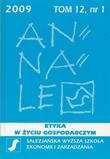Współczesna moralność bez etyki?
Contemporary Morality without Ethics?
Author(s): Kazimierz GryżeniaSubject(s): Economy
Published by: Wydawnictwo Uniwersytetu Łódzkiego
Keywords: classic and post-modernist morality; relativism; subjectivism; irrationalism; autonomy and independence
Summary/Abstract: According to the essential arguments of post-modernism (relativism and subjectivism in particular), which was popular in last decades, there is no point in dealing with moral philosophy. Post-modernists admit, however, that moral is worth discussing yet with a different approach then before. This new approach is totally opposed to the morality of the bygone decades and lacks a wide spectrum of values such as the objective truth, norms or principles and other generally accepted values. The new morality is supposed to compete effectively with the past morals because it is better. In order to prove that post-modernists characterize morality of the past as a set of norms and legal principles which rule the social life. This kind of ethics was bound to heteronymous obligation which determined human life and thus ruined human freedom and autonomy. Every deed which was at variance with the standards was regarded as an offence. In such circumstances people avoid making decisions and rejected responsibility. They felt comforted to obey regulations imposed by authorities. Post-modernists are unable to prove the superiority of their new approach since they have no rational or theoretical arguments. In this approach there is no unchanging human nature or fixed norms or values. Ethics is basically a question of sensitivity and imagination; it is depended on the instinct and impulse – therefore on something subjective, elusive and fastidious. There is no absolute certainty that human decisions and deeds are reasonable and good. If we pursue ethics in this particular way it will become senseless and will result in subjectivism, irrationalism, nihilism, relativism, etc. On the grounds of such ethics it would be possible to both praise and condemn the same deed.
Journal: Annales. Etyka w Życiu Gospodarczym
- Issue Year: 12/2009
- Issue No: 1
- Page Range: 205-217
- Page Count: 13
- Language: Polish

